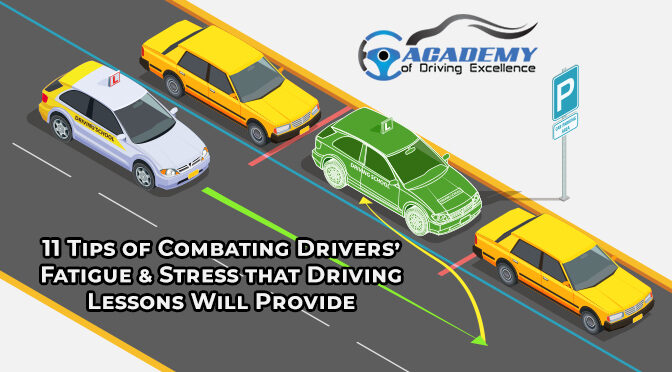It’s quite common for drivers to be struck by fatigue & stress at the wheel, particularly during long drives. Now, this is a dangerous phenomenon and instances of mishaps, some of them fatal, caused because of sleepy drivers are at all rare.
Hence, every reputable driving school has in their intensive driving courses in Melbourne, a chapter included, which discussed in detail how to combat drivers’ fatigue and stress. It’s the same with us at Academy Of Driving Excellence. Our highly experienced driving instructions provide instructions about how to keep at bay drivers’ fatigue and stress. Here on this page, we take a leaf out of their intellect and discuss some of the most effective ways of combating these two driving menaces.
SLEEP
Tip#1: Get enough sleep, before you take to the wheels
This is the best way of keeping stress at bay. You should have a sound sleep for at least 7-8 hours if you have to drive for long. It will help to rejuvenate your alertness and agility.
Tip#2: Reschedule Your Sleeping Pattern
Following Tip#1 can be pretty difficult for those who have to drive for long, daily, and more so when longer is the drive more is the income. In these cases, our experts suggest restructuring the sleeping schedule to squeeze in enough sleeping time in between the driving routine.
Tip#3: Get a Nap, Just Before It’s Time to Drive
In case you haven’t had enough sleep then taking a short power nap just before it’s time to take to the wheels will help a lot to juice up your battery.
Tip#4: Get a Mid-drive Nap
Do not drive at a stretch, when it comes to driving for hours. Every mentor, while giving driving lessons and tips to crack the driving test in Melbourne would suggest taking a mid-drive nap for an hour or two, to rejuvenate yourself.
FOOD
Tip#5: Be Careful About Your Diet
While in transit, it might be alluring to have junk foods, but they may cause your glucose level to increase. Instead, having sandwiches and spinach, and carbohydrate-rich food will help to keep away stress.
Tip#6: Stay Nourished
You must ensure that you are high in spirits while driving. Do not opt for fatty, salty, or sugary foods. They will increase your fatigue. Opt for more fruits, almond, and cashew nuts while you drive.
Tip#7: Take Vitamins
Taking Vitamin B and C supplements (of course after consulting your doctor) will help in a great way.
Tip#8: Have Caffeine…periodically
Having caffeinated drinks like tea, coffee, or energy drinks will help. However, too much caffeine can also lead to more fatigue and can leave people more tired than before. Hence, make sure the intake is controlled.
Tip#9: Staying Hydrated Helps to Gain Energy
Dehydration or lack of fluid intake can lead to nausea, muscle cramps, headaches, and drowsiness. Hence, drink enough water. It will help you to regulate the body temperature, lubricate the muscles and joints, thus keeping cramps and spasms at bay. Most importantly, it keeps your energy level high.
EXERCISE
Tip#10: Stop and Move Around if You Feel Fatigued
Stop driving at the slightest sign of fatigue. Either indulge in a power nap, or get down and move around for some time and relax, or do some stress-busting exercises before moving on.
Tip#11: Do Things That Will Help You to Stay Alert
You can listen to talk shows on air (not music) to stay alert. Keeping the car temperature cool, placing the car seat in a new position, rolling down the windows to get a grasp of fresh air, playing mental games will help to stay sharp and alert.
Thus, you see there are so many ways to stay alert and our instructors at the Academy Of Driving Excellence will explain all of them in detail when giving you the lessons. To know details use phrases like ‘driving schools near me’ to find us at the top of the Search Engine Result Page. For further details, call us at 0425749703 during our business hours.










